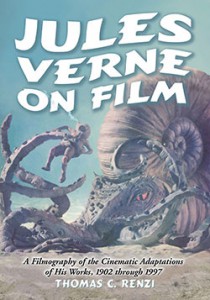Jules Verne on Film
A Filmography of the Cinematic Adaptations of His Works, 1902 through 1997


Average rating: ![]()
| 0 | rating | |
| 0 | rating | |
| 0 | rating | |
| 0 | rating |
Your rating: -
Book Presentation:
Jules Verne—Voila!—a name that resonates with visions of fantastic adventures and images of exotic exploits. In his voyages extraordinaires, the noted French author fuses his encyclopedic knowledge of science and geography with his ability to tell fascinating tales, taking his readers on unprecedented journeys across the globe, into the earth, and out into space. This revered writer, who with his boundless imagination had hoped to contribute substantially to the world of letters, has surpassed that expectation to become coincidentally a significant influence on film.
Jules Verne on Film is both a penetrating analytical overview of Verne’s epic novels and a comprehensive filmography of the numerous films inspired by his stories and characters. There are the obvious adaptations that come directly from the pages of Verne’s writings, films such as In Search of the Castaways and Mysterious Island. However, looking closely at the plots, characters, and themes of many other films—science fiction and otherwise—one discovers that the incomparable Verne has had a far wider influence on filmmakers than one might have thought. For instance, most of us are familiar with Disney’s 20,000 Leagues Under the Sea (1954) and some of us may have even seen the two 1997 television productions. But Verne’s classic undersea adventure also provides the underpinnings for such entertaining movies as Fantastic Voyage (1966) and Innerspace (1987).
Structurally, Jules Verne on Film begins with a biographical sketch and contains 23 chapters arranged alphabetically according to book title, starting with The Adventures of Captain Hatteras and ending with Voyage Across the Impossible. Each chapter includes a summary and analysis of Verne’s story, followed by a chronological treatment of the cinematic adaptations compared to their respective written work. Production credits appear in the film entries, along with plot synopses and thorough critical commentaries.
About the Author:
Thomas C. Renzi is an administrator and instructor at Buffalo State College in Buffalo, New York.
Press Reviews:
"excellent, incisive analysis…handled nicely"—Classic Images; "provides a thorough discussion of Jules Verne film adaptations"—Video Watchdog; "extremely detailed and useful…covers not only the obvious adaptations but many of the cinema’s unacknowledged borrowings from Verne…recommended"—Interzone; "fun…handsomely illustrated throughout…easily readable…the only study currently available that discusses Jules Verne in the context of the international film industry"—Science Fiction Studies; "concise and incisive"—Choice; "comprehensive"—Cirt.
See the publisher website: McFarland & Co
> From the same author:
Screwball Comedy and Film Noir (2012)
Unexpected Connections
> On a related topic:
Hollywood Presents Jules Verne (2015)
The Father of Science Fiction on Screen
by Brian Taves
Subject: Genre > Science Fiction
Noir Fiction and Film (2021)
Diversions and Misdirections
The Literary Monster on Film (2010)
Five Nineteenth Century British Novels and Their Cinematic Adaptations
Phantom Variations (2009)
The Adaptations of Gaston Leroux's Phantom of the Opera, 1925 to the Present
by Ann C. Hall
The Poe Cinema (2003)
A Critical Filmography of Theatrical Releases Based on the Works of Edgar Allan Poe
by Don G. Smith
Cinema of Swords (2023)
A Popular Guide to Movies about Knights, Pirates, Barbarians, and Vikings
Subject: Genre > Adventures